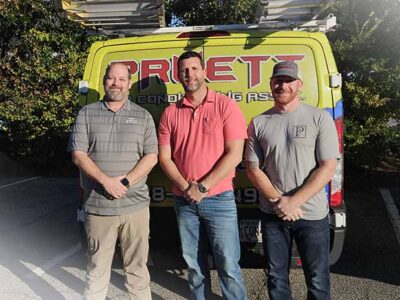Should you have your ductwork professionally cleaned? If you have ever run your HVAC system, then you have definitely accumulated several of the following pollutants: dust, dander, pet hair, pollen, mold, bacteria, as well as insect and vermin nests and feces. Every homeowner in the Macon area who has an HVAC system or is looking at repairing their HVAC system should have the facts when it comes to duct cleaning.
Duct Cleaning FAQs
- Do your home’s ducts need to be cleaned?
- How can you tell? Look at the few visible feet of duct below vents and registers to get an idea of how dirty the ducts are. If dust bunnies are blowing from the registers, that’s another sign that ducts need to be cleaned. Visible evidence of insect and rodent infestation is another red flag. Similarly, if you see mold growing near or on the ducts, schedule a cleaning.
- What happens if dirty ducts aren’t cleaned? Dirt and debris inside ducts can impede airflow to the heating or cooling system. This forces the furnace or A/C to work harder to provide the same degree of comfort. Air quality also can suffer, as conditioned air picks up these contaminants and transports them throughout the home.
- Can your health be endangered by dirty ducts? While a clear connection between cleaning ductwork and improved health hasn’t been established by researchers, there’s no doubt that dirty ducts can contaminate indoor air. It only stands to reason that if your home’s indoor air is carrying mold spores, bacteria and other contaminants, it’s not the best thing for your health.It’s important to note, however, that any duct cleaning that doesn’t also include cleaning of connected HVAC equipment probably isn’t going to do much good in the long run. Ask your duct cleaning specialist about the scope of the work. Does it include the furnace or A/C components?
- How can you tell a good job will be done? As with any home repair job, your best bet is to hire a professional with a solid reputation in your community. Ask for references and check out testimonials. It’s also crucial to make sure the duct cleaning technician is accredited by the National Air Duct Cleaners Association (NADCA). NADCA has a consumer checklist homeowners can review once cleaning ductwork is completed.
- How often is duct cleaning needed? This depends on a number of factors, though some experts suggest every five years or when you move into an older home or complete a major renovation. Factors that will necessitate more frequent duct cleaning include whether your home has hairy pets or smokers, isn’t cleaned regularly, has a lot of pollen-producing foliage nearby, or is located near a dusty road.Also, if you don’t keep up with HVAC maintenance, such as regular air filter changes, you may need more frequent duct cleaning. Finally, if you live in a climate where your forced-air heating and/or cooling systems are operating most of the time, duct cleaning more often can be beneficial. On the other hand, if none of these factors apply to your home, you can likely go several years without needing to have ducts cleaned.
- What methods are used to clean ductwork? NADCA recommends placing ducts under negative air pressure so contaminants can be removed and disposed of. A strong vacuum is used to depressurize the ducts so the debris can be easily sucked out. Often, specialized tools such as soft-bristle brushes are needed to pick away at dirt and other materials that the vacuum can’t dislodge.
- Will chemicals be used? Experts suggest that chemicals really aren’t needed unless mold is found in the ducts. You can ask your contractor to make sure chemical solvent is on the federal EPA’s approved list.
- What’s the best way to avoid the expensive of a duct cleaning? As suggested earlier, regularly replaced HVAC filters, routine and frequent house cleaning, not smoking in the house, regular grooming of pets, and annual HVAC maintenance are all preventive strategies for delaying the necessity of a duct cleaning.
If you’d like to discuss a cleaning ductwork in your Warner Robins or Eastman area home, or for other questions to add to these duct cleaning FAQs, please contact us at Pruett Air Conditioning.

